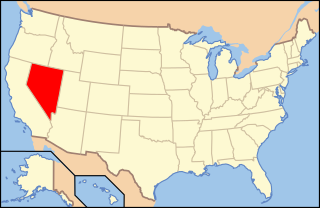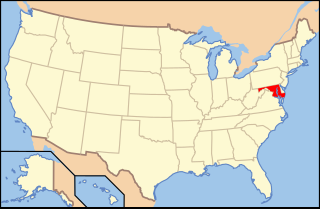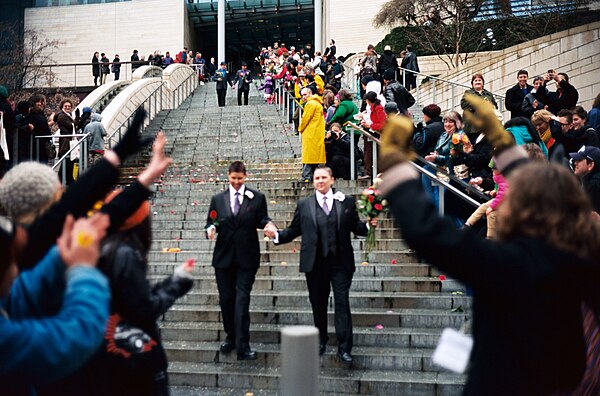
Andersen v. King County, 138 P.3d 963, formerly Andersen v. Sims, is a Washington Supreme Court case in which eight lesbian and gay couples sued King County and the state of Washington for denying them marriage licenses under the state's 1998 Defense of Marriage Act (DOMA), which defined marriage as between a man and a woman. The court ruled that banning same-sex marriage is constitutional since the legislature could reasonably believe it furthers the government interest in promoting procreation.
This is a list of notable events in the history of LGBT rights that took place in the year 2005.
Same-sex marriage has been legally recognized in the U.S. state of New Jersey since October 21, 2013, the effective date of a trial court ruling invalidating the state's restriction of marriage to persons of different sexes.
This page contains a timeline of significant events regarding same-sex marriage and legal recognition of same-sex couples worldwide. It begins with the history of same-sex unions during ancient times, which consisted of unions ranging from informal and temporary relationships to highly ritualized unions, and continues to modern-day state-recognized same-sex marriage. Events concerning same-sex marriages becoming legal in a country or in a country's state are listed in bold.
In response to court action in a number of states, the United States federal government and a number of state legislatures passed or attempted to pass legislation either prohibiting or allowing same-sex marriage or other types of same-sex unions.

Lesbian, gay, bisexual, transgender (LGBT) persons in Puerto Rico, which is an unincorporated territory of the United States, have almost the same protections and rights as heterosexual individuals. Public discussion and debate about sexual orientation and gender identity issues has increased, and some legal changes have been made. Supporters and opponents of legislation protecting the rights of LGBT persons can be found in both of the major political parties. Public opposition still exists due, in large part, to the strong influence of the Roman Catholic Church, as well as socially conservative Protestants. Puerto Rico's status as a United States commonwealth has a great influence on the legal rights of LGBT citizens. Same-sex marriage has been legal in the commonwealth since July 2015, after the U.S. Supreme Court ruled in the case of Obergefell v. Hodges that same-sex marriage bans are unconstitutional.
Same-sex marriage has been legally recognized in the U.S. state of Wisconsin since October 6, 2014, upon the resolution of a lawsuit challenging the state's ban on same-sex marriage. On October 6, the U.S. Supreme Court refused to hear an appeal of an appellate court ruling in Wolf v. Walker that had found Wisconsin's ban on same-sex marriage unconstitutional. The appellate court issued its order prohibiting enforcement of the state's ban on same-sex marriage the next day and Wisconsin counties began issuing marriage licenses to same-sex couples immediately.
State Registered Domestic Partnerships (SRDP) in Washington were created in 2007 following the Andersen v. King County decision. Subsequent legislation has made an SRDP the equivalent of marriage under state law. As a result of the legalization of same-sex marriage in the state, from June 30, 2014, SRDP will be available only when at least one of the partners is sixty-two years of age or older.
This is a list of notable events in the history of LGBT rights that took place in the year 2009.

Lesbian, gay, bisexual, and transgender (LGBT) persons in the U.S. state of Nevada enjoy the same liberties experienced by non-LGBT Nevadans. Same-sex marriage has been legal since October 8, 2014, due to the federal Ninth Circuit Court of Appeals ruling in Sevcik v. Sandoval. Same-sex couples are also allowed to legally adopt, and Nevada law prohibits unfair discrimination on the basis of sexual orientation and gender identity, among other categories, in employment, housing and public accommodations. In addition, conversion therapy on minors is outlawed in the state, as well as the gay panic defense.
Same-sex marriage has been legally recognized in the U.S. state of Nevada since October 9, 2014, when a federal district court judge issued an injunction against Nevada's enforcement of its ban on same-sex marriage, acting on order from the Ninth Circuit Court of Appeals. A unanimous three-judge panel of the Ninth Circuit had ruled two days earlier that the state's ban on same-sex marriage was unconstitutional. Same-sex marriage was previously banned by an amendment to the Constitution of Nevada adopted in 2002.
Same-sex marriage has been legally recognized in the U.S. state of Maine since December 29, 2012. A bill for the legalization of such marriages was approved by voters, 53-47 percent, on November 6, 2012, as Maine, Maryland and Washington became the first U.S. states to legalize same-sex marriage by popular vote. Election results were certified by the Maine Secretary of State's office and the Governor of Maine on November 29.
Same-sex marriage has been legally recognized in the U.S. state of North Carolina since October 10, 2014, when a U.S. District Court judge ruled in General Synod of the United Church of Christ v. Cooper that the state's denial of marriage rights to same-sex couples was unconstitutional. The state's Governor and Attorney General had acknowledged that a recent ruling in the Fourth Circuit Court of Appeals and the U.S. Supreme Court's decision not to hear an appeal in that case established the unconstitutionality of North Carolina's ban on same-sex marriage. State legislators sought without success to intervene in lawsuits to defend the state's ban on same-sex marriage.

The 2009 Washington Referendum 71 (R-71) legalized domestic partnership in Washington state, the first statewide referendum in the United States that extended to LGBT people the rights and responsibility of domestic partnership. The bill had passed State Legislature, and it was signed into law by the Governor in May 2009, but opponents gathered enough signatures to put the measure before the voters, who returned ballots by mail over three weeks ending on November 3, 2009, approving the measure 53% to 47%. The new law went into effect 30 days later, on December 3, 2009.

The expansion of lesbian, gay, bisexual, and transgender (LGBT) rights in the U.S. state of Maryland is a recent phenomenon, with most advances in LGBT rights occurring within the past two decades. Maryland has had statewide protections against discrimination based on an individual's sexual orientation since 2001 and gender identity since 2014. Legislation to legalize same-sex marriage in Maryland was approved by voters on November 6, 2012 and went into effect on January 1, 2013. Today, the state of Maryland is regarded as one of the most pro-LGBT states in the country, with two-thirds of Marylanders supporting same-sex marriage. In May 2018, a ban on conversion therapy on minors was signed into law by the Governor, and it became effective on October 1, 2018.

Lesbian, gay, bisexual, and transgender (LGBT) rights in the U.S. state of Washington have evolved significantly since the late 20th century. LGBT people are fully protected from discrimination; Washington enacted LGBT protections in 2006. Same-sex marriage has been legal since 2012, and same-sex couples are allowed to adopt. Conversion therapy on minors has also been illegal since 2018.

Lesbian, gay, bisexual, transgender, and queer (LGBTQ+) rights in the U.S. state of Maine are a recent occurrence, with most advances and enhances in LGBT rights in the state taking place since the early 2000s. LGBTQ+ people in Maine have some of the same rights and responsibilities as heterosexuals, however may face some legal issues not experienced by non-LGBTQ+ residents.

Maine Question 1 was a voter referendum conducted in Maine in 2009 that rejected a bill legalizing same-sex marriage in the state. The measure passed 53%–47% on November 3, 2009.

Referendum 74 was a Washington state referendum to approve or reject the February 2012 bill that would legalize same-sex marriage in the state. On June 12, 2012, state officials announced that enough signatures in favor of the referendum had been submitted and scheduled the referendum to appear on the ballot in the November 6 general election. The law was upheld by voters in the November 6, 2012 election by a final margin of 7.4% and the result was certified on December 5.
Same-sex marriage has been legally recognized in the U.S. state of Virginia since October 6, 2014, following a decision by the Supreme Court of the United States to refuse to hear an appeal of the Fourth Circuit Court of Appeals in the case Bostic v. Schaefer. Marriages of same-sex couples subsequently began at 1:00 p.m. on October 6 after the Circuit Court issued its mandate, and since then Virginia has performed legal marriages of same-sex couples and recognized out-of-state marriages of same-sex couples.

















